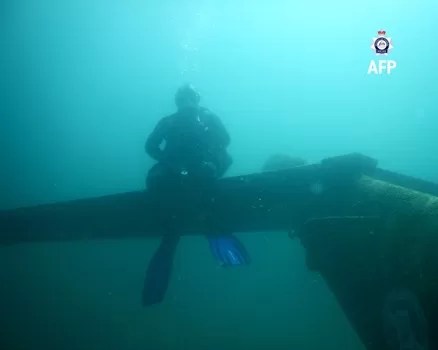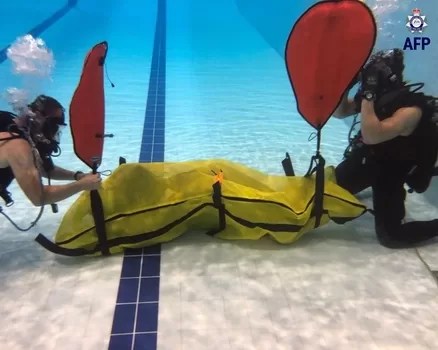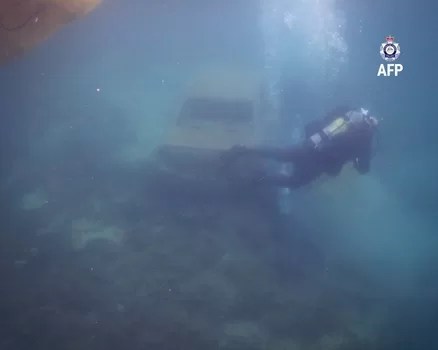In a groundbreaking move, the Australian Federal Police (AFP) has introduced a pioneering program to enhance its forensic capabilities in aquatic crime scenes. This new initiative, known as the underwater search and evidence recovery (USER) program, aims to equip AFP police divers with advanced training and techniques for recovering crucial forensic evidence from submerged items, such as murder weapons, vehicles, or bodies.
Our story on Australian Federal Police divers continues after this advertisement:
Enhancing Evidence Collection Underwater
Dr. Eva Bruenisholz, an AFP Forensics officer who helped develop the program, addressed a common misconception about forensic evidence in water.
“While water does have an effect on forensic traces, applying USER techniques maximizes the chances of recovering forensic evidence such as DNA, fingerprints, and firearm and bullet striations,” she explained.


She emphasized the importance of this program given Australia’s extensive coastline and numerous inland lakes and rivers where criminals might attempt to conceal evidence.
“Australia’s extensive coastline and numerous inland lakes and rivers where criminals might try to conceal or dispose of evidence make it important to explore any techniques to enhance the AFP’s ability to collect and preserve evidence from aquatic scenes.”
Techniques and Training
“AFP divers are often searching in rivers or lakes where they have very limited visibility, so they are searching for evidence by feel rather than sight,” Dr. Bruenisholz said.
In low-visibility conditions, relying on touch rather than sight, divers use buoys to mark the locations of submerged items, assisting investigators in understanding how and why the items were found in specific places.
“This can then assist investigators to establish how and why a person or an item was found at a particular place – such as did they fall or were they thrown, or did water currents impact the location,” Dr. Bruenisholz said.


The USER program teaches divers how to handle submerged items minimally to prevent contamination, how to package exhibits underwater, and how to document the search process through photographs and videos.
International Collaboration and Development
The catalyst for the USER program was the AFP’s participation in an Underwater Criminal Investigations (UCI) dive course in the United States in October 2022.
Detective Senior Constable Chris Markcrow from the AFP Maritime Team recounted the experience, highlighting their collaboration with various American dive teams, including state police, the DEA, and local fire departments.
During the trip, AFP police divers assisted the local Muscogee Sheriff’s Department in Columbus in searching the Chattahoochee River for a murder weapon, learning valuable techniques from their US counterparts.
“The AFP divers were able to learn from their US counterparts in a real-life scenario, while also navigating the dangers of the waterway – including keeping themselves safe from an alligator seen only a few hundred metres downstream.”
Upon returning to Australia, the AFP Maritime Team collaborated with AFP Forensics to develop a pilot USER program, drawing inspiration from similar projects in France and Switzerland.
Dr. Bruenisholz expressed confidence that equipping divers with specialist skills in underwater evidence search and recovery would enhance their ability to resolve crimes involving aquatic scenes.
She compared the current state of underwater forensic techniques to the early days of DNA technology, emphasizing the importance of collecting and storing items for potential future investigations.
“We don’t know what technological advances may happen in the future to enable better exploitation of forensic evidence from items that have been in water,” she said. “This makes it important to collect and store items for potential future investigations.”
“We owe it to the community to introduce new techniques to solve crimes and protect the Australian community.”
Success and Future Plans
The USER program has already shown success. AFP Crime Scene Investigator Simon Gardner highlighted the importance of collaboration between police divers and crime scene investigators.
He stressed that early engagement between the two groups ensures that underwater work considers forensic needs and diving limitations.
The program will be rolled out to AFP maritime members across Australia over the next 12 months, with plans to continue refining and developing new USER techniques through international collaboration.
Detective Senior Constable Markcrow shared a recent success story, where an AFP diver, trained under the USER program, recovered a crime victim’s belongings from Canberra’s Lake Tuggeranong. The diver used search patterns to find small items, including keys and a phone.
The AFP’s new underwater crime scene program marks a significant advancement in forensic investigation, promising to enhance the collection and preservation of evidence from aquatic environments and ultimately aid in solving crimes to protect the Australian community.

Further reading from Amazon: LONDON POLICE DIVERS STORIES 1983 TO 1996 Paperback, 2020 by Mackenzie William Moulton
Related stories
Remembering the Jakarta Embassy Bombing 20 Years on
The Ultimate Guide to Keeping a Saltwater Aquarium
Photographer Frank Hurley on the Great Barrier Reef future
Police forensic artists explain Missing Persons age progressed images
Discovering the Secret Lives of Blue Whales in Timor-Leste
The Wreck of the Dunbar: A Sydney Tragedy
Historic WWII wreck that sank with 1080 people found
Another toxic leak from decrepit Bass Strait Esso platforms
Nikonos III 35mm underwater film camera
INTERPOL’s global database of Stolen Works of Art



